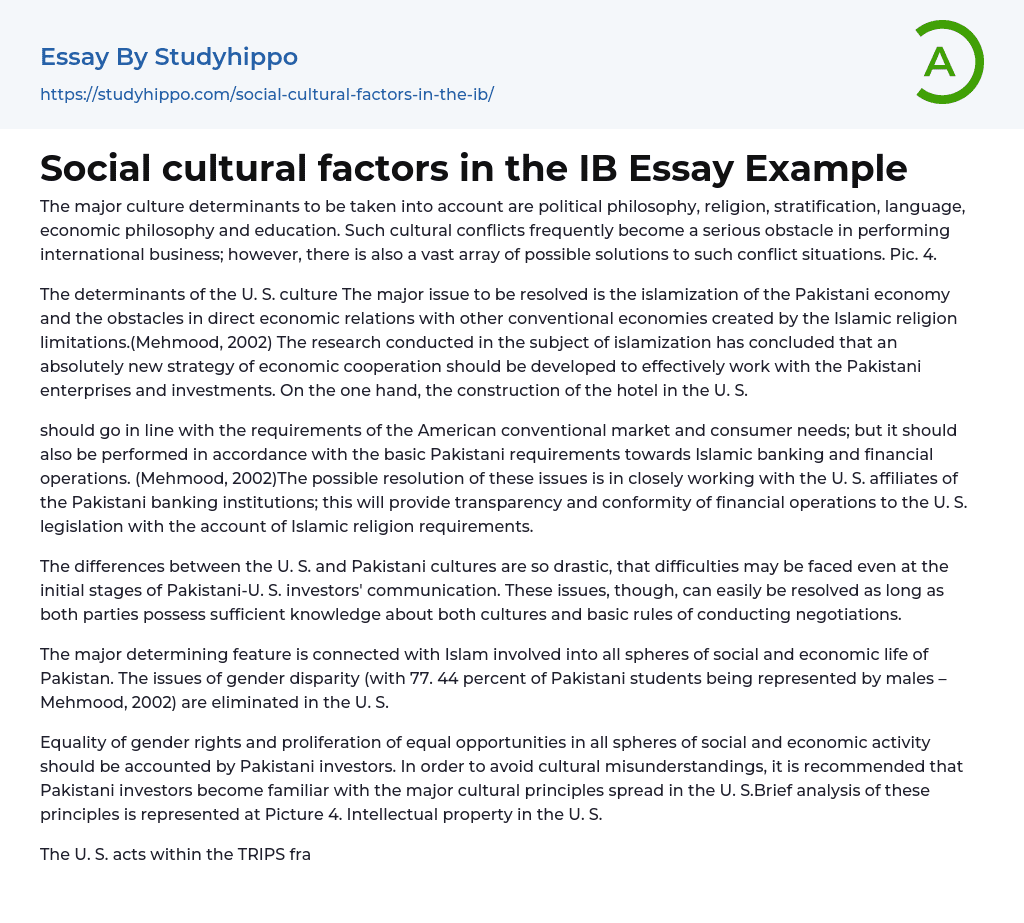It is crucial to take into account different cultural factors such as political beliefs, religion, social hierarchy, language usage, economic ideology, and education level when engaging in global commerce. Even though these aspects may lead to disagreements, there are various approaches to address them. For more information on this topic, please see Pic. 4.
The U.S. culture is shaped by various factors. One of the major challenges faced by Pakistan's economy is the hindrance caused by Islamic religious restrictions in establishing direct economic ties with other conventional economies. According to Mehmood (2002), the islamization process has necessitated the development of a new economic cooperation strategy to effectively engage with Pakistani businesses and investments. On the other hand, there are plans for constructing a hotel in the U.S.
To ensure the success of financial operations in Pakistan, it is important to comply with American market standards and
...consumer demands as well as Islamic banking requirements. Mehmood (2002) proposes that partnering with U.S. affiliates of Pakistani banks is the optimal approach to guaranteeing transparency and adherence to both American laws and Islamic religious principles.
Communication between American and Pakistani investors may be hindered by cultural disparities. However, with adequate knowledge of their respective cultures and negotiation strategies, these obstacles can be easily surmounted.
In Pakistan, Islam is the prevailing influence on both social and economic conditions, pervading all facets of society. In contrast, gender inequality is less prominent in the United States, with male students comprising 77.44% of Pakistani student population according to Mehmood (2002).
Pakistani investors should prioritize gender equality and equal opportunities in all aspects of social and economic activities. They should also gain familiarity with major cultural principles in
the U.S., as outlined in Picture 4, to prevent misunderstandings. Furthermore, considering intellectual property is crucial when investing in the U.S.
The U.S. abides by the TRIPS regulations for overseeing and interpreting intellectual property rights, but this implementation is often disputed due to its perceived deviation from established U.S. laws and policies.
The US places great importance on intellectual property rights, as evidenced by the continuous growth of legal instruments regulating them in response to technological advancements. Even though 69.1% of surveyed legal organizations (Haedricke, 2005) held a conventional belief that integrating TRIPS provisions into the US was beneficial, this viewpoint is being challenged.
The legislative framework could contradict article 337 provisions and curtail the rights of foreign importers. However, it is clear that the Section 337 procedure is generally faster and less expensive than other proceedings, despite any faults. This procedure and the corresponding TRIPS enforcement provisions reflect the growing emphasis on trade in international intellectual property law. They also demonstrate that effective enforcement of intellectual property rights can be particularly advantageous in commercial settings, as noted by Haedricke (2005). In conclusion, the US economic environment involves high political risks but also significant economic opportunities.
Investing in hotel construction in the USA carries significant risks due to the stark contrast between the economic philosophies of Pakistan and the US. Nevertheless, given that high risks often yield substantial rewards, the potential benefits of investing in the US are noteworthy.
The potential benefits for foreign investors in the US economy are much greater than the associated risks. Additionally, the US government is actively seeking to attract further foreign investment into the economy, while the hotel industry shows significant growth potential.
Therefore, it is possible to conclude that a Pakistani investor can profitably establish a hotel in the USA, provided effective management takes into account potential economic dangers and challenges facing the hotel industry.
BibliographyBaker, JC 2003, Financing international trade, Praeger. Bernarke, B ; Gertler, M 2001, 'Should central banks respond to movements in asset prices? ', American Economic Review, vol. 91, pp.253-257. Bowen, JT ; Kotler, P 2006, Marketing for hospitality and tourism, Pearson Prentice Hall. Brink, CH 2007, Measuring political risks: Risks to foreign investment, Ashgate Publishing. Cohen, SD 2007, Multinational corporations and foreign direct investment: Avoiding simplicity, embracing complexity, Oxford University Press.
In the Journal of International Business Studies, FJ Contractor (2004) discusses the examination of organizational forms in the international hotel industry and modal choice in a world of alliances. The volume and pages of the article are 29 and 92-98, respectively.
- Asset essays
- Depreciation essays
- Discounted Cash Flow essays
- Foreign Direct Investment essays
- Funds essays
- Internal Rate Of Return essays
- Revenue essays
- Day Trading essays
- Futures Trading essays
- Capital market essays
- Million essays
- Payment essays
- Rate Of Return essays
- Funding essays
- Hedge Fund essays
- Electronics essays
- Computer Science essays
- Consumer Electronics essays
- Enterprise Technology essays
- Hardware essays
- Robot essays
- engineering essays
- people search essays
- Modern Technology essays
- Impact of Technology essays
- Cloud Computing essays
- Operating Systems essays
- Information Technology essays
- Data Analysis essays
- Information Age essays
- Smartphone essays
- Cell Phones essays
- Camera essays
- Computer essays
- Ipod essays
- Mobile Phones essays
- 3g essays
- Bluetooth essays
- Cell Phones in School essays
- Computer File essays
- Desktop Computer essays
- Servers essays
- Data collection essays
- Graphic Design essays
- Data Mining essays
- Cryptography essays
- Internet essays
- Network Security essays
- Android essays
- Computer Security essays




